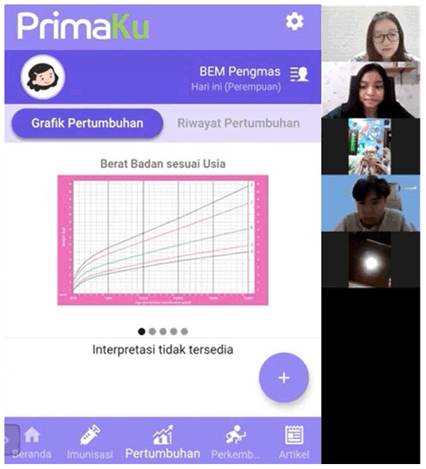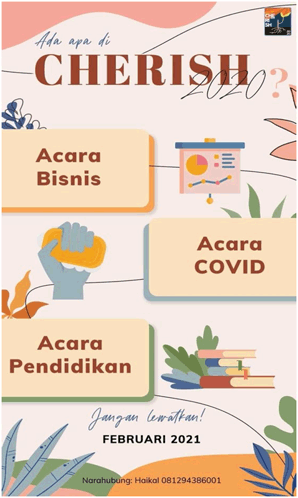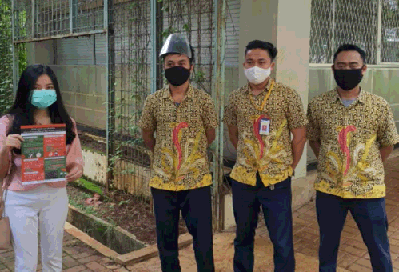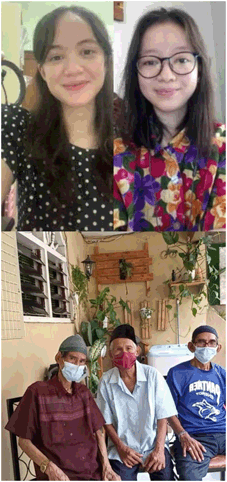Members of Our Team Conducting Tele-education about the ‘Primaku’ Application during the Tinggi Cerdas virtual event.

Angelina Patricia Chandra1, Stella Kristi Triastari1, Shafira Aurelia1, Muhammad Mikhail Athif Zhafir Asyura1
doi: http://dx.doi.org/10.5195/ijms.2022.1449
Volume 10, Number 3: 328-332
Received 18 03 2022; Rev-request 02 05 2022; Rev-recd 09 05 2022; Accepted 13 07 2022
ABSTRACT
The Tri Dharma Perguruan Tinggi or The Three Pillars of Higher Education are common principles associated with university students in Indonesia. Out of the three, giving back to the community resonates greatly with medical students, especially when aligned with the Hippocratic Oath. Although, since the COVID-19 pandemic started, students pondered how to continue giving back to society in light of new limitation on face-to-face interactions. This experience recounts a brief account of creative efforts made by students from the faculty of medicine, Universitas Indonesia (FMUI) in finding ways to empower the community in such drastic times. Kampung Lio is a village directly taken care of by the faculty. Before the pandemic, efforts made to develop the community included conducting free general checkups and health assessments later used as baseline data for our community development program. Efforts to continue development during COVID-19 utilized many different virtual mediums in conducting online-based events. Health promotion was conducted using e-booklets sent via WhatsApp groups filled by the villagers from Kampung Lio. Telehealth also played a huge role in our intervention, as we succeeded in conducting a hybrid intervention - combining remote painting classes while calling and providing an ear for them to listen. Despite intervention still being possible, a proper assessment of the community's ability to utilize such online platforms is recommended before execution. Furthermore, to maximize engagement with the community, building a good rapport is necessary, which could be achieved through small interactions prior to the intervention even through online means.
Keywords: Community Participation; COVID-19; Indonesia; Medical Student (Source: MeSH-NLM).
The Tri Dharma Perguruan Tinggi or The Three Pillars of Higher Education are common principles associated with university students in Indonesia. The three values which are “Education, Research, and Giving Back to The Community” act as a voice of reason for activities created and led by students.1 The community efforts conducted by medical students have fundamentals that are aligned with the core values instilled in the Hippocratic Oath.2 Medical students may wonder how community efforts should be conducted during times of isolation and social distancing. 3 With uncertainties and limitations on face-to-face activities, medical students had to ponder creatively on methods to give back to the community. With regard to that matter, as third year medical students from Indonesia, we would like to share our hardships and efforts in persistently engaging with the community despite the pandemic situation.
As medical students, we resonate more with community engagement efforts that directly involve face-to-face interaction. Before COVID-19, medical students in the Faculty of Medicine, Universitas Indonesia (FMUI) were involved in various community efforts, with most of them situated in rural regions in proximity of the campus. The FMUI students conducted various community efforts, including free mass circumcision, general checkups, and health promotion events in Kampung Lio, our community development village. We believe that empathy and the willingness to help others need to be practiced since our first year in medical school. In accordance with that belief, first year medical students are given the opportunity to participate in the programs such as conducting annual assessment on metabolic diseases, maternal and reproductive health, personal hygiene, and eco-friendliness. These assessment indicators were gathered via personal interview of Kampung Lio's residents and became the foundation of the community development program. Other than Kampung Lio, the students also conducted a community engagement program within the faculty, called FKUI Peduli (FMUI Care). The program included health consultation with doctors from various health specialties in FMUI's affiliated hospital. Doctors would examine the patients, give health advice, and treatments to the employees working in FMUI including the janitors and security guards. Therefore, FKUI Peduli was a way to give back and appreciate their services.
However, familiarity of the norm shifted during the pandemic. Medical students were forced to adapt and think of creative ways of community outreach approaches in online scenarios. The massive difference lies in the inability to interact directly with people, challenging medical students to embrace values of community empowerment just by sitting in front of their desktop screens. Moreover, screen-to-screen interaction increases the difficulty of building rapport with the community, thus they may get disinterested and even doubt the student's intentions in the first place. Due to the pandemic, we were forced to carry out the three pillars of higher education through conducting programs, which were tailored to accommodate restrictions placed. In addition, the pandemic also forced us to think broadly by exploring other variables such as: (1) their financial difficulties that could interfere with their overall health, (2) the online-learning method which lowers children's motivation in Kampung Lio to study, and (3) the lack of encouragement of Kampung Lio's community health workers efforts on Kampung Lio.
Different from engagement, development aims to change and monitor certain communities to improve them in a wider and more sustainable scale.4 Continuing our 5-year community development program, three events were still hosted in Kampung Lio despite the online scenario. Firstly, community assessment in which descriptive data of residents were gathered semi-online while some of us (in small groups) visited Kampung Lio onsite. The second event was called Tinggi Cerdas, or literally translated as “Tall and Smart”(Figure 1). The program aimed to increase knowledge about maternal and reproductive health for mothers of children under 5 years -with heavy emphasis on the prevention of stunting of growth. We recruited 26 volunteers from our faculty who performed interventions once a month from September to December 2020 using E-Booklets via WhatsApp Call. Since it was our first online intervention, both the turn-out and engagement rate were low. Despite only a few joining, the mothers in Kampung Lio were all enthusiastic and interactive throughout the video call session. Some of the volunteers even bonded with the mothers, as they offered multiple interventions during the development program. Moreover, we conducted training for community health workers via ZOOM meetings on the PrimaKu application - an app by the Indonesian Pediatric Society designed to monitor child growth and development.
Members of Our Team Conducting Tele-education about the ‘Primaku’ Application during the Tinggi Cerdas virtual event.

Our last event, CHERISH, was the highlight of our annual community development program. Public health events such as cervical cancer screening, medical checkups, and sexual health education were conducted for free.
However, according to our pre-event assessment in 2020, the COVID-19 pandemic did not only affect the health of the residents, but also their financial stability. To further help the residents of Kampung Lio, we altered our health programs and initiated a business education program to alleviate their knowledge on alternative ways of gaining income. The event emphasized on educating the residents of Kampung Lio about entrepreneurship and financial management. Moreover, we helped in eliminating misconceptions about COVID-19 and reiterated the importance of vaccination during the pandemic (Figure 2). Efforts to better gain trust from the people were conducted through trivia games in the WhatsApp Group prior to the main event. Initially, expectations around enthusiasm were moderate as we knew that the novelty of the program may maybe perceived as alien by the people in Kampung Lio. However, the event received high caliber of enthusiasm with many interested in learning to better their financial status. This enthusiasm might be due to the prizes provided for winners of the business model competition as incentives for them to start their own businesses. With such funding, the participants were encouraged to boost their business, in which some of the businesses are continuing to grow past the six months follow-up we conducted. During the COVID-19 education event for children, we conducted a virtual puppet show in which we created a video tale about three characters fighting an imaginary character, Monster Cora, an analogy for the SARS-CoV-2 virus. At the end of the video, we encouraged the children to make a video on how they would defeat Monster Cora. The children joyfully made videos about them practicing hand hygiene, wearing masks, and physical distancing. The health cadres of Kampung Lio also participated in the event, in which we organized a competition for them to conduct health education and promotion to their local communities. Training of the health cadres were facilitated by the local primary health care center, which would hopefully would also increase the public's trust on local health care facilities and workers.
Introductory Poster of Our Largest Annual Event, CHERISH. From Top left to bottom left, the words say in Bahasa Indonesia: Business event, COVID-19 event, and education event.

As previously mentioned, FKUI Peduli was a way to give back to the working staff members of FMUI (Figure 3). However, due to social restrictions during the pandemic, we tried other means to reach out the staff members. Those efforts included conducting telemedicine, appreciation videos, and gathering donations. In telemedicine, employees consulted doctors through video calls facilitated by students. Meanwhile, appreciation videos were made from thank you notes written by students to thank the employees for their tireless efforts in taking care our in-campus facilities. Lastly, donations consisting of food and masks, were distributed to the employees.
One of Our Members Meeting Non-Teaching Staff and Janitors in the FKUI Peduli event.

Additionally, we conducted a program named RELIVE, which aimed to help the elderly in a nursing home during the pandemic (Figure 4). The fundamental aim of this program was to help comfort the elderly through the expressing their feelings and facilitation of dealing with negative emotions during isolation. The program included sharing sessions in small groups through video calls between the elderly and committee members. We also conducted a pottery painting class to engage them in hands-on activities at home. The pottery was auctioned online with all revenue received donated to the nursing home. The main challenge encountered was the inadequate number of smartphones available for the programs to be conducted virtually.
Two of Our Members in a Videocall with Three Nursing Home Residents who Took Part in Our RELIVE Event.

After the community efforts were conducted, we interviewed some medical students (volunteers) to receive feedback on how the programs can be further improved. The interviewees were very grateful for the medium provided to learn about empathy and care for others, even during uncertain times. They expressed their struggles in gaining the people's trust and enthusiasm; thus, when it was achieved, words could not express the amount of happiness it brought them. They also believed that it is our role as medical students to keep on persevering during the pandemic through hearty efforts for the overall health of the community. The experience was also beneficial in teaching the volunteers on how to implement World Health Organization's Five Stars Doctor in future practice, especially as community leaders.
The pandemic pushes medical students to think holistically and adapt programs with current needs of the people. Some recommendations to be noted before conducting virtual programs include proper assessment of the people's ability to utilize online platforms and assessment on the help needed during the pandemic. The interventions conducted would also have to consider the duration of screen-time (a maximum of 3-4 hours), as the participants may experience difficulty in affording highly compatible gadgets alongside stable internet connections. During that short time-frame, the committee needs to maximize interactive discussions and prioritize the essential educational purpose of the program. Moreover, building rapport with the people is recommended prior to the virtual intervention through various means, including conducting virtual games, and increasing interaction through texts and calls.
In addition, a follow up session is necessary to ensure the sustainability of the intervention.
In short, community engagement is still possible despite the harrowing pandemic situation we are currently in. Throughout the course of the pandemic, we managed to adapt the majority of our engagement programs in virtual settings. Despite certain limitations being present, the virtually boundless setting made it possible to us to invite speakers of high caliber with decreased funding and even collaborated with universities miles away from our faculty. Community engagement done online is still a possibility, although there should be an emphasis on the community's technical capability to engage online. Although one might argue about the impact these interventions actually make within the society. Therefore, in conducting activities we should remind ourselves the simplest definition of giving back to the community: “To help and share one's time with others”.
Sebuah Upaya untuk Melanjutkan Kegiatan Pemberdayaan Komunitas oleh Mahasiswa Kedokteran di Tengah Pandemi COVID-19
Tri Dharma Perguruan Tinggi merupakan prinsip yang dijunjung tinggi oleh mahasiswa di Indonesia. Diantara ketiga prinsip tersebut, pengabdian masyarakat sangat erat kaitannya dengan mahasiswa kedokteran. Namun, di tengah pandemi COVID-19, kegiatan pengabdian masyarakat menjadi lebih sulit dilakukan karena keterbatasan interaksi tatap muka. Dalam artikel ini, penulis akan menjelaskan mengenai upaya mahasiswa Fakultas Kedokteran Universitas Indonesia dalam melaksanakan dan mengadaptasikan kegiatan pengabdian masyarakat pada masa pandemi COVID-19 ini. Sebelum pandemi COVID-19, mahasiswa Fakultas Kedokteran Universitas Indonesia telah melakukan berbagai kegiatan pengabdian masyarakat, seperti cek kesehatan umum dan pengambilan data kesehatan di kampung binaan kami, yakni Kampung Lio. Saat pandemi COVID-19 terjadi, kegiatan pengabdian masyarakat diadaptasikan dalam bentuk daring. Salah satunya adalah pelaksanaan kegiatan penyuluhan kesehatan melalui buku digital yang dikirim melalui grup warga Kampung Lio pada aplikasi Whatsapp. Penulis juga melaksanakan kegiatan gabungan daring dan luring, yakni pelatihan melukis pot bagi para lansia di panti jompo. Sebelum acara pelatihan melukis, panitia mengadakan acara perkenalan dengan para lansia di panti jompo tersebut. Pada acara perkenalan, panitia mendengarkan cerita para lansia. Setelah melukis, pot lukisan lansia tersebut dijual pada acara penggalangan dana. Dana yang diperoleh dari acara tersebut didonasikan seluruhnya untuk keperluan panti jompo.
Berdasarkan pengalaman kami, kami merefleksikan bahwa sebelum melakukan kegiatan pengabdian masyarakat secara daring, perlu dipastikan bahwa komunitas masyarakat tujuan memiliki akses internet dan mampu menggunakan aplikasi tertentu (misalnya Zoom meeting). Selain itu, memiliki hubungan baik dengan komunitas masyarakat tujuan menjadi hal yang penting. Hal tersebut dapat dilakukan dengan melakukan interaksi atau membuat acara perkenalan sebelum intervensi dilakukan.
The authors would like to thank all of the participants of the programs. The authors would also like to thank and acknowledge dr. Dewi Friska, a lecturer of the Faculty of Medicine, Universitas Indonesia, for the suggestions and help in conducting the programs. The authors would also like to express gratitude to all of the committees of the event. Finally, the authors are also grateful for the support from the faculty.
The Authors have no funding, financial relationships or conflicts of interest to disclose.
Conceptualization: APC, SKT, SA, and MMAZA. Methodology: APC, and MMAZA. Formal Analysis: APC, SKT, and SA. Data Curation: APC, SKT, and SA. Investigation: APC, SKT, and SA. Writing – Original Draft: APC, SKT, and SA. Writing – Review & Editing: APC, and MMAZA. Visualization: MMAZA. Supervision: APC. Project Administration: APC.
1. Universitas Katolik Parahyangan. Public teaching, the realization of tri dharma perguruan tinggi/the three pillars of higher education. Available from: https://unpar.ac.id/public-teaching-the-realization-of-tridharma-perguruan-tinggi-the-three-pillars-of-higher-education/?lang=en. Cited Sep 2, 2021.
2. Berdine G. The hippocratic oath and principles of medical ethics. The Chronicles. 2015;3(9):28–2.
3. Urban Institute. Community engagement during the COVID-19 pandemic and beyond. Available from: https://www.urban.org/sites/default/files/publication/102820/community-engagement-during-the-covid-19-pandemic-and-beyond.pdf. Last updated Sep, 2020; cited Sep 2, 2021.
4. Australian Government. Community engagement and development. Available from: https://commdev.org/pdf/publications/Community-Engagement-and-Development.pdf. Last updated Sep, 2006; cited Sep 2, 2021.
Angelina Patricia Chandra, 1 Third-year Medical Student. Universitas Indonesia, Depok, Indonesia.
About the Author: Angelina is currently a third-year medical student of Universitas Indonesia of a 5,5 year program. They are also active in numerous student organizations and activities, including community development.
Stella Kristi Triastari, 1 Third-year Medical Student. Universitas Indonesia, Depok, Indonesia.
About the Author: Stella is currently a third-year medical student of Universitas Indonesia of a 5,5 year program. They are also active in numerous student organizations and activities, including community development.
Shafira Aurelia, 1 Third-year Medical Student. Universitas Indonesia, Depok, Indonesia.
About the Author: Shafira is currently a third-year medical student of Universitas Indonesia of a 5,5 year program. They are also active in numerous student organizations and activities, including community development.
Muhammad Mikhail Athif Zhafir Asyura, 1 Third-year Medical Student. Universitas Indonesia, Depok, Indonesia.
About the Author: Muhammad Mikhail is currently a third-year medical student of Universitas Indonesia of a 5,5 year program. They are also active in numerous student organizations and activities, including community development.
Correspondence: Angelina Patricia Chandra. Address: Pondok Cina, Beji, Depok City, West Java 16424, Indonesia. Email: angelina.patricia@ui.ac.id
Editor: Francisco J. Bonilla-Escobar Student Editors: Sebastian Diebel & Ahmed Nahian Copyeditor: Nikoleta Tellios Proofreader: xx Layout Editor: Ana Maria Morales Process: Peer-reviewed
Cite as: Chandra AP, Triastari SK, Aurelia S, Zhafir Asyura MMA. Assess, Adapt, & Innovate: An Effort to Ensure Sustainability of Medical Student-led Community Engagement during the COVID-19 Situation in Indonesia. Int J Med Stud. 2022 Jul-Sep;10(3):328-32.
Copyright © 2022 Angelina Patricia Chandra, Stella Kristi Triastari, Shafira Aurelia, Muhammad Mikhail Athif Zhafir Asyura
This work is licensed under a Creative Commons Attribution 4.0 International License.
International Journal of Medical Students, VOLUME 10, NUMBER 3, August 2022